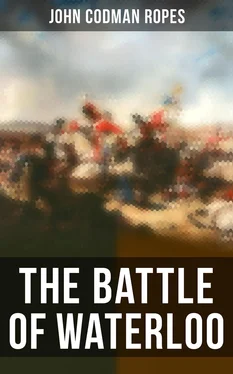As for Jomini116 and Charras,117 they admit that, when Napoleon perceived the impossibility of seizing Sombreffe on the 15th, he ceased to desire the occupation of Quatre Bras, and was quite content with Ney’s advance remaining for the night at Frasnes. In their conclusion we may, for the reasons we have just given, well agree, without committing ourselves to their theory of Napoleon’s plan, which, as we have seen above, differs materially from his own account of it.
We conclude, therefore, that the result of the operations of the first day had also been satisfactory so far as the non-occupation of Quatre Bras was concerned. But Marshal Ney’s command was far from being well in hand at the close of the day, as we have had occasion to point out above.118
3. But, it may fairly be asked, in view of what has been said, assuming that Napoleon gave Ney a verbal order at five o’clock in the afternoon of the 15th, why, if the non-occupation of Quatre Bras by Ney on that evening did not really disarrange Napoleon’s plans, did Napoleon blame Marshal Ney for not having occupied it? Because, in the first place, it was a disobedience of orders; secondly, because Napoleon believed that Ney’s stopping at Frasnes, this side of Quatre Bras, was dictated by an exaggerated caution, which it was equally surprising and annoying to find in a man like Ney; and, thirdly because when he came to write his narrative of the campaign, he connected this hesitation to take risks, which Ney had evinced on the 15th, with Ney’s very singular management of his command on the next day,—of which we can here say nothing without anticipating our story. It was to Ney’s supposed faulty arrangements on the 16th that the Emperor—who never knew all the facts of the case, by the way,—naturally attributed the failure of the 1st Corps to take part either in the battle of Quatre Bras or in that of Ligny. Hence we find Napoleon severe on Ney for not boldly pushing out to Quatre Bras on the evening of the 15th, not because it was necessary to occupy the cross-roads that night,—for the next morning would have done quite as well,—but because Ney’s hesitation seemed to the Emperor to indicate in him a lack of that boldness and energy on which he had always counted hitherto with entire confidence.
4. In what has just been said, we have assumed that Napoleon gave to Ney a verbal order at five o’clock on the 15th to push forward with the two corps and seize Quatre Bras. But was this the fact?
This question has been the subject of a great deal of controversy, as every student of the campaign knows to his cost. In our view, as we have just pointed out, it is not a matter of much consequence. Napoleon nowhere claims that the failure of Marshal Ney to carry out this order was a serious matter, although he does attribute his failure to carry it out to an undue prudence and an unnecessary caution, for which he censures him. Still, the matter has been so hotly contested, that it may be best to address ourselves to it briefly.
The statements in Gourgaud’s narrative119 and the Memoirs,120 that Napoleon ordered Ney, at their meeting near Gilly, to advance boldly to Quatre Bras with his two corps and to take up a position beyond it, with guards on the roads to Nivelles, Brussels and Namur, are exceedingly positive and explicit. These statements were written in 1818 and 1820. The only piece of strictly contemporaneous evidence that we have is the statement in the official bulletin of the army,121 which was sent off from Charleroi on the evening of the 15th, that Ney’s headquarters were that evening at Quatre Bras,—and it certainly is a very strong confirmation of Gourgaud and the Memoirs.122
Again, the reason given in Gourgaud123 and the Memoirs124 as inducing Ney to halt this side of Quatre Bras, namely, that he deemed it unwise to advance further to the front than the main body had proceeded,—judging by the sound of the cannon, which came from the neighborhood of Fleurus and Gilly,—is a very natural125 one. It is no doubt the reason he gave to the Emperor at their interview that very night at Charleroi.
Neither Ney nor Soult have left any statements in writing126 about the matter. Nor is it claimed that Ney ever made any verbal statement on the subject. Thiers127 asserts that Soult “frequently said * * * that on the afternoon of the fifteenth of June he heard Napoleon order Marshal Ney to proceed to Quatre Bras,” and he cites the memoirs of General Berthezène, who commanded one of Vandamme’s divisions, to the effect that Soult had told him that Napoleon gave these orders to Ney.
On the other hand we have a statement of Ney’s son, then Duke of Elchingen, that Colonel Heymès, Ney’s aide-de-camp, said in 1841 to him,128 that the name of Quatre Bras was not pronounced in the conversation between the Emperor and Marshal Ney on the afternoon of the 15th. The Duke furthermore tells us129 that in 1829, Marshal Soult told him and Colonel Heymès that the Emperor had no idea of having Quatre Bras occupied on the evening of the 15th, and gave no orders to that effect.
But how is it possible to reconcile this hearsay evidence, with the undeniable fact that the official bulletin states Ney’s headquarters on the evening of the 15th to be at Quatre Bras? It is surely much more likely that these reports by Marshal Ney’s son, of statements by Heymès and Soult, of their recollections, given respectively fourteen and twenty-six years after the occurrence, are defective in some way, than that the bulletin made up on the very evening should have contained a statement that Ney was at Quatre Bras when he had never been directed to go there. The contents of the bulletin must have been known to Soult, the chief-of-staff of the army; in fact, the bulletin itself must have been either actually composed by him or under his immediate direction; and it is simply incredible that he should have inserted a statement that Ney’s headquarters were, on the evening of the 15th, at Quatre Bras if he knew that the Emperor had no intention of having Quatre Bras occupied that evening, and had given no orders to that effect. It is to be noted also that Charras makes but an incidental mention of the bulletin,130 which is the only bit of contemporaneous evidence that we have, and confines his discussion of the testimony to an examination of these reported sayings of Soult and Heymès. When we take also into account that, in his carefully drawn Narrative,131 Heymès does not explicitly state that Quatre Bras was not mentioned, that there is nothing whatever from Soult over his own signature, that these sayings of Soult and Heymès rest on mere hearsay evidence, and that they were spoken, if spoken at all, many years after the campaign, it is evident that the statement in the bulletin is by far the best evidence that we have. The mention of Quatre Bras in the bulletin was made at the time,—before any controversy had arisen,—it was moreover a mere incidental mention, and cannot be supposed to have been intended to serve a purpose of any kind.
Where the evidence is so conflicting, it is impossible for many persons to make up their minds. As we remarked before, the matter is not one of any great importance in its bearing on the fortunes of the campaign. The question, whether Ney received at five in the afternoon of the 15th of June verbal orders to seize Quatre Bras that evening, is of consequence mainly with reference to the scope of Napoleon’s plan at that moment, and also with respect to his reproach of unwarrantable hesitation on the part of Marshal Ney. It seems to us, we frankly say, on the whole, almost certain that the order was given. At any rate, we can hardly doubt that, when the bulletin was sent off that evening to Paris, it was believed at the headquarters of the army that Marshal Ney was at Quatre Bras; we must admit this, unless we gratuitously invent an intention to deceive the public on a point of this kind. And as Ney could hardly have been supposed to occupy Quatre Bras without orders, he must have been supposed by those who drew up the bulletin,—that is, Soult, the chief-of-staff of the army, and the Emperor himself,—to have proceeded to Quatre Bras in conformity with the verbal order given him that afternoon.132
Читать дальше












